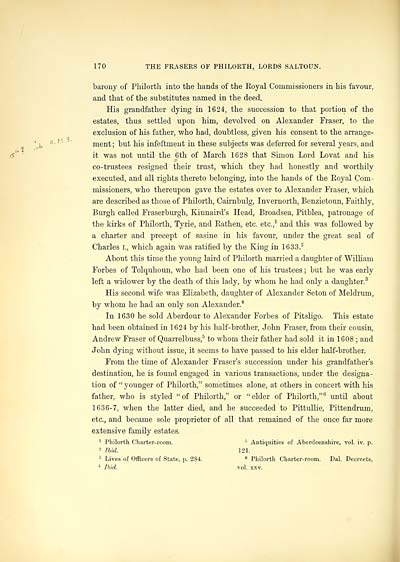Frasers of Philorth > Volume 1
(210)
Download files
Complete book:
Individual page:
Thumbnail gallery: Grid view | List view

170 THE FRASERS OF PHILORTH, LORDS SALTOUN.
barony of Philorth into the hands of the Royal Commissioners in his favour,
and that of the substitutes named in the deed.
His grandfather dying in 1624, the succession to that portion of the
estates, thus settled upon him, devolved on Alexander Fraser, to the
exclusion of his father, who had, doubtless, given his consent to the arc-ange-
ls 3
ment; but his infeftment in these subjects was deferred for several years, and
iS- it was not until the 6th of March 1628 that Simon Lord Lovat and his
co-trustees resigned their trust, which they had honestly and worthily
executed, and all rights thereto belonging, into the hands of the Eoyal Com-
missioners, who thereupon gave the estates over to Alexander Eraser, which
are described as those of Philorth, Cairnbulg, Invernorth, Benzietoun, Faithly,
Burgh called Fraserburgh, Kinnaird's Head, Broadsea, Pitblea, patronage of
the kirks of Philorth, Tyrie, and Eathen, etc. etc., 1 and this was followed by
a charter and precept of sasine in his favour, under the great seal of
Charles I., which again was ratified by the King in 1633. 2
About this time the young laird of Philorth married a daughter of William
Forbes of Tolquhoun, Avho had been one of his trustees ; but he was early
left a widower by the death of this lady, by whom he had only a daughter. 3
His second wife was Elizabeth, daughter of Alexander Seton of Meldrum,
by whom he had an only son Alexander. 4
In 1630 he sold Aberdour to Alexander Forbes of Fitsligo. This estate
had been obtained in 1624 by his half-brother, John Fraser, from their cousin,
Andrew Fraser of Quarrelbuss, 5 to whom their father had sold it in 1 608 ; and
John dying without issue, it seems to have passed to his elder half-brother.
From the time of Alexander Fraser's succession under his grandfather's
destination, he is found engaged in various transactions, under the designa-
tion of " younger of Philorth," sometimes alone, at others in concert with his
father, who is styled "of Philorth," or "elder of Philorth," 6 until about
1636-7. when the latter died, and he succeeded to Pittullie, Pittendrum,
etc., and became sole proprietor of all that remained of the once far more
extensive family estates.
1 Philorth Charter-room. 5 Antiquities of Aberdeenshire, vol. iv. p.
2 Ibid. 121.
3 Lives of Officers of State, }>. 284. 6 Philorth Charter-room. Dal. Decreets,
4
Ibid. vol. xxv.
barony of Philorth into the hands of the Royal Commissioners in his favour,
and that of the substitutes named in the deed.
His grandfather dying in 1624, the succession to that portion of the
estates, thus settled upon him, devolved on Alexander Fraser, to the
exclusion of his father, who had, doubtless, given his consent to the arc-ange-
ls 3
ment; but his infeftment in these subjects was deferred for several years, and
iS- it was not until the 6th of March 1628 that Simon Lord Lovat and his
co-trustees resigned their trust, which they had honestly and worthily
executed, and all rights thereto belonging, into the hands of the Eoyal Com-
missioners, who thereupon gave the estates over to Alexander Eraser, which
are described as those of Philorth, Cairnbulg, Invernorth, Benzietoun, Faithly,
Burgh called Fraserburgh, Kinnaird's Head, Broadsea, Pitblea, patronage of
the kirks of Philorth, Tyrie, and Eathen, etc. etc., 1 and this was followed by
a charter and precept of sasine in his favour, under the great seal of
Charles I., which again was ratified by the King in 1633. 2
About this time the young laird of Philorth married a daughter of William
Forbes of Tolquhoun, Avho had been one of his trustees ; but he was early
left a widower by the death of this lady, by whom he had only a daughter. 3
His second wife was Elizabeth, daughter of Alexander Seton of Meldrum,
by whom he had an only son Alexander. 4
In 1630 he sold Aberdour to Alexander Forbes of Fitsligo. This estate
had been obtained in 1624 by his half-brother, John Fraser, from their cousin,
Andrew Fraser of Quarrelbuss, 5 to whom their father had sold it in 1 608 ; and
John dying without issue, it seems to have passed to his elder half-brother.
From the time of Alexander Fraser's succession under his grandfather's
destination, he is found engaged in various transactions, under the designa-
tion of " younger of Philorth," sometimes alone, at others in concert with his
father, who is styled "of Philorth," or "elder of Philorth," 6 until about
1636-7. when the latter died, and he succeeded to Pittullie, Pittendrum,
etc., and became sole proprietor of all that remained of the once far more
extensive family estates.
1 Philorth Charter-room. 5 Antiquities of Aberdeenshire, vol. iv. p.
2 Ibid. 121.
3 Lives of Officers of State, }>. 284. 6 Philorth Charter-room. Dal. Decreets,
4
Ibid. vol. xxv.
Set display mode to:
![]() Universal Viewer |
Universal Viewer | ![]() Mirador |
Large image | Transcription
Mirador |
Large image | Transcription
Images and transcriptions on this page, including medium image downloads, may be used under the Creative Commons Attribution 4.0 International Licence unless otherwise stated. ![]()
| Histories of Scottish families > Frasers of Philorth > Volume 1 > (210) |
|---|
| Permanent URL | https://digital.nls.uk/96568020 |
|---|
| Attribution and copyright: |
|
|---|
| Description | A selection of almost 400 printed items relating to the history of Scottish families, mostly dating from the 19th and early 20th centuries. Includes memoirs, genealogies and clan histories, with a few produced by emigrant families. The earliest family history goes back to AD 916. |
|---|

